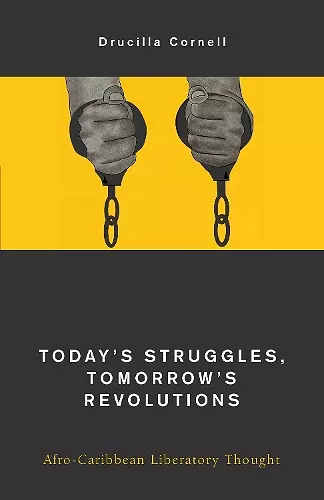Today's Struggles, Tomorrow's Revolutions
Afro-Caribbean Liberatory Thought
Format:Hardback
Publisher:Bloomsbury Publishing PLC
Published:26th Oct '22
Currently unavailable, and unfortunately no date known when it will be back

The black insurgence movement and experiments in Caribbean socialism, following the work of the committed revolutionary CLR James, have resounding significance for the political struggles of today. This book addresses class struggle and the battle against racialized capitalism, which in turn makes us reconceptualize the idea of revolution, liberation and rebellion by focusing on this great revolutionary theorist.
Renowned political theorist Drucilla Cornell argues that the universal heartbeat of the struggle for socialism is a new praxis of being human together beyond the exploitation of colonial-racial capitalism. On this basis, this book’s intervention emphasizes the continuous history of revolution, rather than understanding revolutions as “events” that either succeed or fail. In today’s moment, with the simultaneity of the collapse of the post-Cold War neoliberal order and climate change, the struggle over what it means to be human on the planet has taken on a new urgency. Cornell argues that the greatest vectors of this revolutionary struggle for a new humanity are Black, decolonial, and queer movements, as they show us ways of being beyond the reign of white economic man. Placing the insights of these struggles in conversation with “traditional” Marxist thought, this book speaks to the pragmatic questions of insurrection, insurgency, rebellion, and revolution in a way that speaks to the politics of our time.
Across four chapters and a conclusion, Cornell explores revolutions involving diverse nations, theorists, and writers. The introduction details racism, decolonization, socialism, and the queer movement’s role in forging revolutions and mentions many renowned theorists, including Toni Morrison. The first chapter examines violence and nonviolence using theories of Frantz Fanon, Max Weber, Thomas Hobbes, Hannah Arendt, Angela Davis, and Étienne Balibar, who propose collective action to address ethnic and political struggles and violence. Citing C. L. R. James's socialist ideology, the second chapter recounts revolutions in Europe and Black liberations. The following chapter addresses revolutions and organizations and considers the role of political parties in insurrections. The final chapter centers on feminism, particularly Black feminism, and mentions the works of Barbara Smith and bell hooks. Another focus of the book is on ethics and morals and includes citations from Immanuel Kant, Carol Gilligan, and Lawrence Kohlberg. The conclusion, “Tomorrow’s Revolution,” sounds the revolutionary call for democratic socialism. Recommended. Undergraduates through faculty and general readers. * Choice Reviews *
Drucilla Cornell's Today's Struggle, Tomorrow's Revolution: Afro-Caribbean Revolutionary Thought is a firecracker of a book! Cornell draws on current events, scholarly erudition, and street protest to project Afro-Caribbean struggle as global revolution against racialized capitalism. Cornell calls for real economic democracy for global justice that de-centers Europe and the US. -- Naomi Zack, Lehman College, CUNY
With her typical insight and rigor, Cornell offers in this book a profound and provocative call to action. Drawing from a deep well of resources in Afro-Caribbean Philosophy, the South African shack-dwellers’ movement, and Black Lives Matter, this book articulates a vital and timely “political spirituality” directed toward a genuine human liberation. -- Michael J. Monahan, University of Memphis
Barack Obama has declared that uBuntu was Mandela’s greatest gift to South Africa and to humanity. By giving to that concept its full force and meaning as the open-ended project of achieving a new way of being human together, Drucilla Cornell’s book offers the most powerful demonstration of that statement. -- Soulemayne Bachir Diagne, director of the Institute of African Studies, Columbia University
ISBN: 9781538168486
Dimensions: 223mm x 148mm x 18mm
Weight: 363g
154 pages